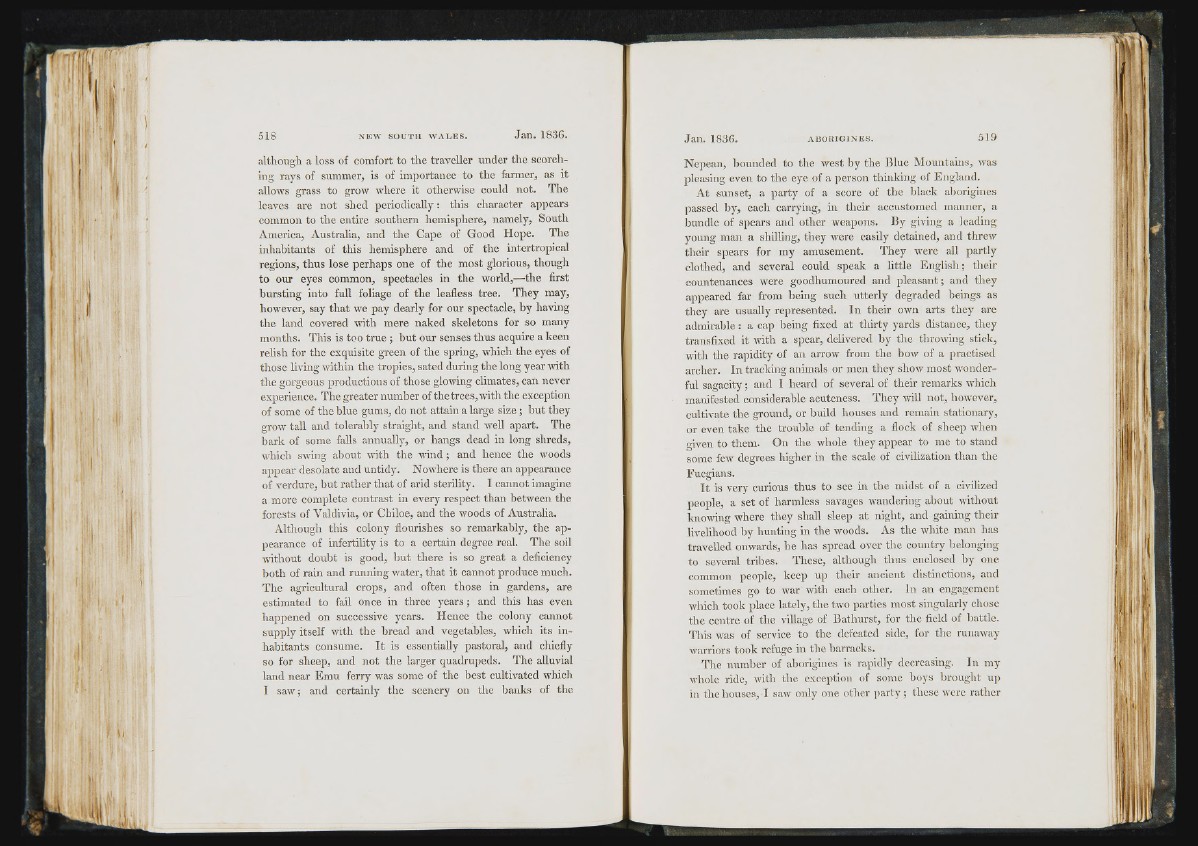
b j|
518 N E W S O U T H W A L E S . Jan. 1836.
although a loss of comfort to the traveller under the scorching
rays of summer, is of importance to the farmer, as it
allows grass to grow where it otherwise could not. The
leaves are not shed periodically: this character appears
common to the entire southern hemisphere, namely. South
America, Australia, and the Cape of Good Hope. The
inhabitants of this hemisphere and of the intertropical
regions, thus lose perhaps one of the most glorious, though
to our eyes common, spectacles in the world,—^the first
bursting into full foliage of the leafless tree. They may,
however, say that we pay dearly for our spectacle, by having
the land covered with mere naked skeletons for so many
months. This is too true ; but our senses thus acquire a keen
relish for the exquisite green of the spring, which the eyes of
those living within the tropics, sated during the long year with
the gorgeous productions of those glowing climates, can never
experience. The greater number of the trees, with the exception
of some of the blue gums, do not attain a large size ; but they
grow tall and tolerably straight, and stand well apart. The
bark of some falls annually, or hangs dead in long shreds,
which swing about with the wind; and hence the woods
appear desolate and untidy. Nowhere is there an appearance
of verdure, but rather that of arid sterility. I cannot imagine
a more complete contrast in every respect than between the
forests of Valdivia, or Chiloe, and the woods of Australia.
Although this colony flourishes so remarkably, the appearance
of infertility is to a certain degree real. The soil
without doubt is good, but there is so great a deficiency
both of rain and running water, that it cannot produce much.
The agricultural crops, and often those in gardens, are
estimated to fail once in three years; and this has even
happened on successive years. Hence the colony cannot
supply itself with the bread and vegetables, which its inhabitants
consume. It is essentially pastoral, and chiefly
so for sheep, and not the larger quadrupeds. The alluvial
land near Emu ferry was some of the best cultivated which
I saw; and certainly the scenery on the banks of the
Jan. 1836. A B O R IG I N E S .
Nepean, bounded to the west by the Blue Mountains, was
pleasing even to the eye of a person thinking of England.
At sunset, a party of a score of the black aborigines
passed by, each carrying, in their accustomed manner, a
bundle of spears and other weapons. By giving a leading
young man a shilling, they were easily detained, and threw
their spears for my amusement. They were all partly
clothed, and several could speak a little English; their
countenances were goodhumoured and pleasant; and they
appeared far from being such utterly degraded beings as
they are usually represented. In their own arts they are
admirable: a cap being fixed at thirty yards distance, they
transfixed it with a spear, delivered by the throwing stick,
with the rapidity of an arrow from the bow of a practised
archer. In tracking animals or men they show most wonderful
sagacity; and I heard of several of their remarks which
manifested considerable acuteness. They will not, however,
cultivate the ground, or build houses and remain stationary,
or even take the trouble of tending a flock of sheep when
given to them. On the whole they appear to me to stand
some few degrees higher in the scale of civilization than the
Fuegians.
I t is very curious thus to see in the midst of a civilized
people, a set of harmless savages wandering about without
knowing where they shall sleep at night, and gaining their
livelihood by hunting in the woods. As the white man has
travelled onwards, he has spread over the country belonging
to several tribes. These, although thus enclosed by one
common people, keep up their ancient distinctions, and
sometimes go to war with each other. In an engagement
wliich took place lately, the two parties most singularly chose
the centre of the village of Bathurst, for the field of battle.
This was of service to the defeated side, for the runaway
warriors took refuge in the barracks.
The number of aborigines is rapidly decreasing. In my
whole ride, with the exception of some boys brought iqi
in the houses, I saw only one other party ; these were rather